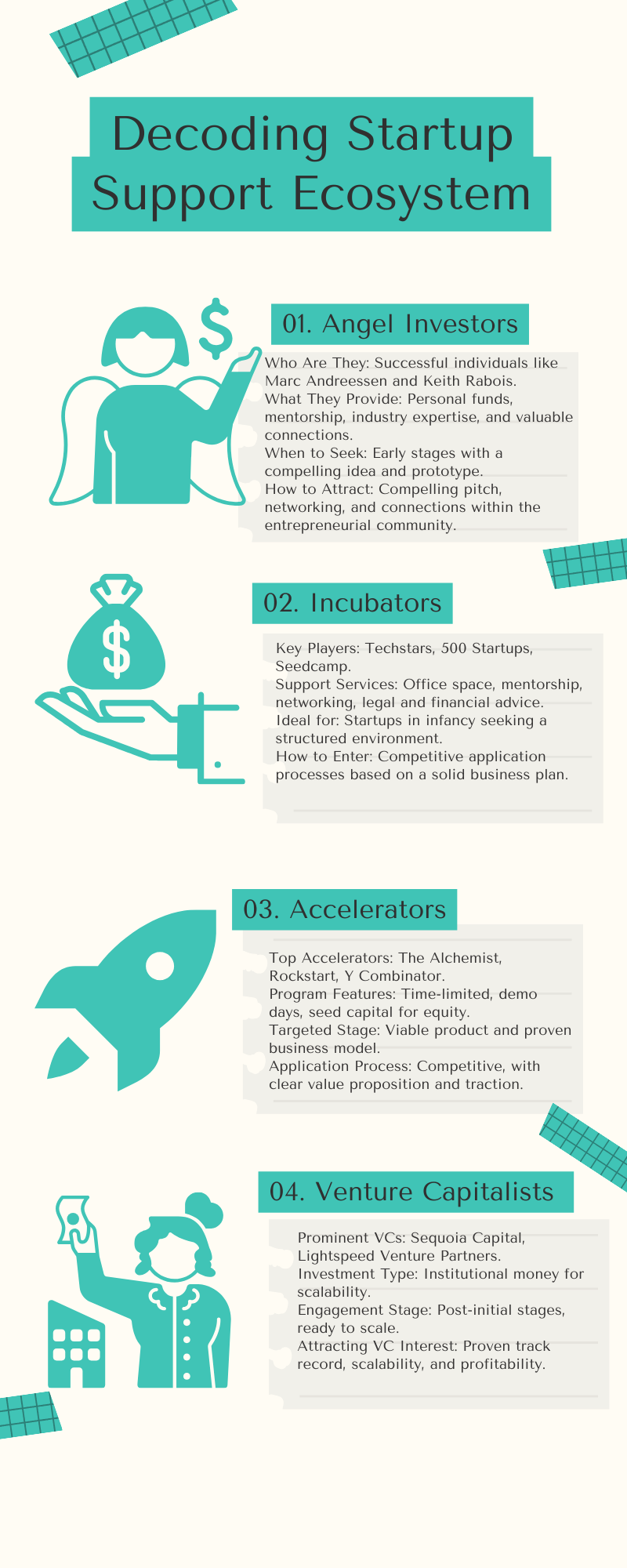Angel investors, incubators, accelerators, and venture capitalists are key players in the startup ecosystem, each contributing to the growth and success of new businesses. They share the common goal of supporting innovative ideas.
However, they differ in their approaches, structures, and roles. Understanding the distinctions between these entities is crucial for entrepreneurs seeking funding and guidance.
In this blog, we'll delve into the unique characteristics of angel investors, incubators, accelerators, and venture capitalists.
1. Angel Investors: The Early Supporters
I look at two things while angel investing. Are you solving an important problem? Do you care about the end users?
— Gary Vee, CEO, VaynerMedia
Big news for startups! The Expanding American Entrepreneurship Act aims to double angel investors to 500 & raise fund caps to $50M, fueling innovation across the US!
— Lizelle van Vuuren (@lizelle) November 20, 2023
Entrepreneurship is so important. Good job @startupsUSAorg pic.twitter.com/6HF96Gmzmx
Angel investors are individuals who provide capital for startups in exchange for ownership equity or convertible debt. Unlike other funding sources, angel investors are often successful entrepreneurs or business professionals who invest their funds.
These individuals are drawn to the potential for high returns and the excitement of being involved in the early stages of a promising venture.
Some of the popular angel investors are:
- Marc Andreessen
- Roger Ehrenberg
- Keith Rabois
- Mark Goines
- Kevin Rose
One of the defining features of angel investors is their hands-on approach. Beyond financial backing, angels often offer:
- mentorship
- industry expertise
- valuable connections
This personalized support can be a significant advantage for startups navigating the complexities of the business landscape.
When to Seek Angel Investors
Angel investors, often successful entrepreneurs themselves, play a crucial role in the early stages of a startup. When a founder has a compelling idea and a prototype but lacks the necessary capital to bring it to market, seeking an angel investor becomes a strategic move.
How to Attract Angel Investors
To attract angel investors, startups need a compelling pitch that highlights not only the uniqueness of their product or service but also the potential for significant returns. Personal connections and networking within the entrepreneurial community can often lead to introductions to angel investors.
Benefits for Startups
Beyond financial support, angel investors bring valuable mentorship and industry insights. Their personal involvement can significantly enhance a startup's chances of navigating the challenges of the early stages and positioning itself for future growth.
2. Incubators: Nurturing Startups to Maturity
Incubators are organizations designed to foster the growth of startups by providing comprehensive support services. These services may include:
- office space
- mentorship
- networking opportunities
- access to resources such as legal and financial advice
Incubators typically operate on a fixed-term basis, ranging from a few months to a couple of years. Some of the popular incubators are:
- Techstars
- 500 Startups
- Seedcamp
- MassChallenge
The primary goal of incubators is to nurture early-stage companies, helping them develop a solid foundation and increase their chances of success. In return for their support, incubators may take equity in the startups they assist. This shared ownership aligns the interests of the incubator with those of the startup, creating a symbiotic relationship.
When to Join an Incubator
Incubators are ideal for startups in the infancy of their development. When a founder seeks a structured environment, mentorship, and access to a range of support services, joining an incubator can be a strategic move.
How to Enter an Incubator
Incubators often accept startups through competitive application processes. A compelling business plan, a viable product or service, and a dedicated team are crucial elements that can make a startup stand out.
Benefits for Startups
Incubators provide more than just funding; they offer a supportive ecosystem for startups to grow. From shared office spaces to expert guidance, incubators nurture early-stage companies, increasing their chances of long-term success.
3. Accelerators: Fast-Tracking Growth
Accelerators share similarities with incubators but are distinguished by their focus on rapid growth and scalability. Accelerator programs are usually time-limited, lasting several months and culminating in a demo day where startups pitch their businesses to potential investors. Some of the accelerators are:
- The Alchemist Accelerator
- Rockstart Accelerator
- Founders Factory
- Y Combinator
In addition to providing mentorship and resources like incubators, accelerators often offer seed capital in exchange for equity. The intense, immersive nature of accelerator programs aims to propel startups forward at an accelerated pace. The emphasis is on refining business models, enhancing products or services, and preparing for the next stage of funding.
When to Enroll in an Accelerator
Accelerators are designed for startups with a viable product and a proven business model, aiming to scale rapidly. When a founder is ready to accelerate growth, refine strategies, and secure additional funding, joining an accelerator becomes a strategic choice.
How to Get into an Accelerator
Accelerators often have competitive application processes, similar to incubators. Startups with a clear value proposition, market traction, and a dedicated team are attractive candidates for accelerator programs.
Benefits for Startups
Accelerators offer an intense and immersive experience, focusing on scaling operations quickly. The structured programs, mentorship, and exposure to a network of investors provide startups with the tools and resources needed to take their businesses to the next level.
4. Venture Capitalists: Scaling for Success
Venture capitalists (VCs) are professional groups or funds that manage pooled money from various investors to invest in startups and small businesses with significant growth potential.
Unlike angel investors, venture capitalists operate as firms and invest institutional money rather than personal funds. VCs typically enter the picture when a startup has progressed beyond the initial stages and is ready to scale. Some of the popular venture capitalists are:
- Sequoia Capital
- Bessemer Venture Partners
- Lightspeed Venture Partners
- New Enterprise Associates
Venture capitalists bring not only capital but also extensive industry knowledge and experience. They play an active role in shaping the strategic direction of the companies they invest in and often seek a seat on the board of directors. While VCs aim for substantial returns on their investments, they also bear higher risks, as not all startups in their portfolio may succeed.
When to Seek Venture Capital
Venture capitalists come into the picture when a startup has proven its potential for growth and scalability. When a founder has reached a stage where significant capital is required to expand operations, enter new markets, or solidify market dominance, seeking venture capital is a strategic move.
How to Attract Venture Capital
Venture capitalists are attracted to startups with a proven track record, a scalable business model, and a clear path to profitability. Networking, building relationships within the industry, and showcasing a robust business plan are key elements in attracting venture capital.
Benefits for Startups
Venture capitalists not only provide substantial capital but also offer strategic guidance and industry expertise. Their involvement often goes beyond monetary support, as they actively participate in shaping the direction of the startup, aiming for mutual success.
Helping You Make an Informed Decision

Angel investors provide early-stage support with personal funds and hands-on guidance. Incubators nurture startups in their infancy, offering a structured environment and support services.
Accelerators focus on rapid growth, providing immersive programs and seed capital. Venture capitalists step in for scaling, bringing substantial institutional funds and strategic expertise.
Understanding the unique contributions of these entities, timing their engagement strategically, and building relationships within the entrepreneurial community are key for startups seeking success in the competitive landscape.





Leave a reply